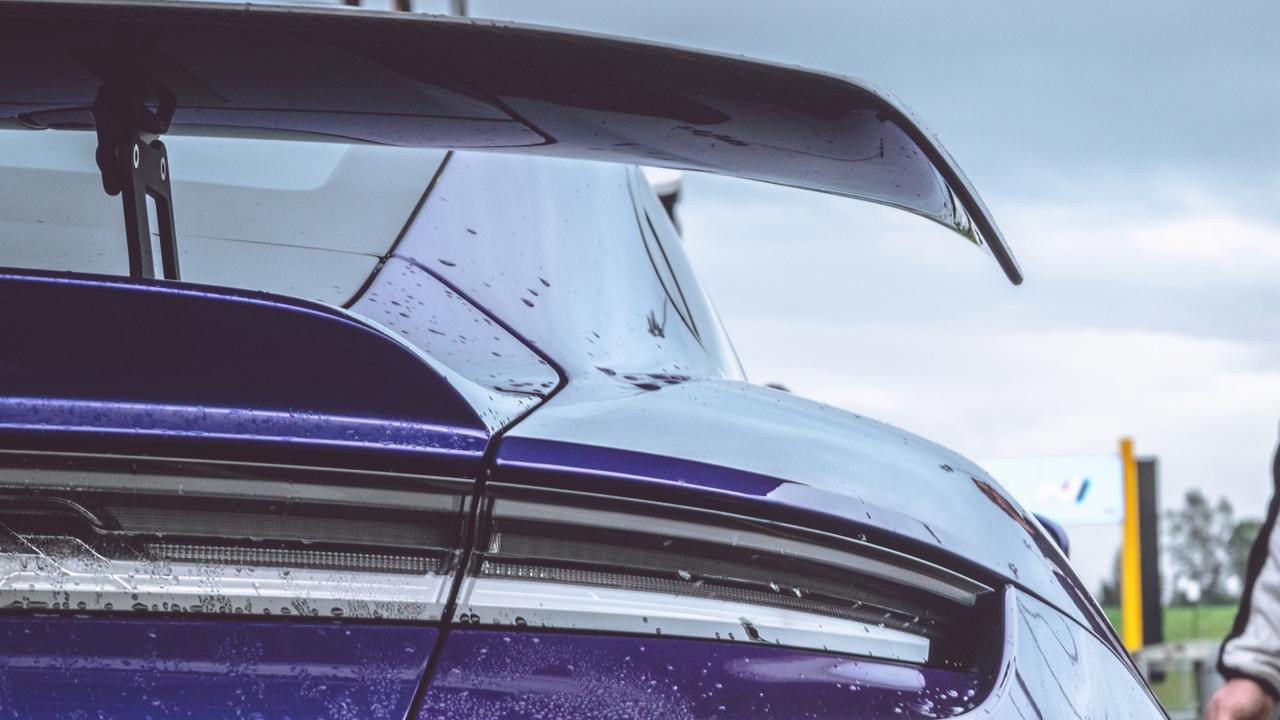By David McCowen
Copyright news

It comes from the driver’s seat, as opposed to the staggering 815kW of electric motors rocketing you toward the horizon.
Breath is squeezed from your chest as your head slaps back against the carbon fibre bucket seat of this immensely capable machine.
MORE: Porsche’s Taycan Turbo GT unleashed
I guarantee there will be some sort of squeak, shriek or guttural groan from anyone exposed to the Taycan’s launch mode for the first time.
You can hear it over the mechanical whirring noises and electronically synthesised hum from the few speakers remaining in a cabin stripped of luxuries to save weight.
Appropriately enough for something with the performance of a jet fighter, there’s a military feel to this Taycan.
Lightweight seats have minimal padding.
There’s less insulation and sound absorbing material than you’ll find in other models.
A simple carbon fibre shell replaces back seats deleted in the name of weight reduction, and a couple of simple speakers replace the Bose hi-fi of luxury versions.
Forget about heated seats or a powered tailgate.
They even removed the clock.
So you might struggle to record the brief bursts of acceleration offered by this push for increased power and reduced weight.
Porsche claims the car named after its “Weissach” test track can rip to 100km/h in 2.2 seconds, or hit 0-200km/h in 6.4 seconds before slamming into a top speed limited to 305km/h.
Independent testing suggests it is even quicker than that.
American magazines lucky enough to test all manner of seriously exotic machines up to and including $5 million Bugattis reported that the purple Porsche is the quickest car they’ve ever tested.
A demonstration run at Sydney Dragway returned a 9.083 second run to the quarter mile, crossing the 400 metre mark in a staggering 252.04km/h.
MORE: Why EV sales are tipped to explode
That’s fast enough to get you kicked out of the drag strip, told to return with a safety parachute to help slow the car.
Fitted with the same gearshift paddles found on Porsche’s track-bred 911 GT3, the Taycan’s left paddle controls brake regeneration, while the right paddle activates an “attack mode” that pumps an extra 120kW to its Pirellis for a few seconds at a time.
The result is a car that shrinks straights like few others.
MORE: Tesla flips the switch on self-driving cars
It will whip past conventional sports cars as though they’re idling along in neutral.
It handles better than it has any right to, helped by the cleverness of four-wheel-steering and active suspension that ramp up agility while working to resist pitch and roll.
Enormous carbon ceramic brakes have immense stopping power, and the racing seats work with communicative steering to paint a vivid picture of the track surface and its available grip.
The car’s development team did a great job of making it feel like a Porsche, even if it doesn’t have the soaring engine and snappy transmission of its other sports cars.
In years gone by, we would have described this car as having about 1200 horsepower – triple what you might find in a conventionally fast car.
Technical documents speak the new language of electric vehicles, extolling the benefits of pulse inverters with a maximum current of 900 amperes, silicon carbide used as semiconductor material, and reduced switching losses with higher switching frequencies.
We need to get used to these terms.
Porsche has already replaced combustion power with electricity in its best-selling Macan, and its next generation Boxster and Cayman two-seaters replace petrol power with batteries, too.
The brand has also teased a top-end hypercar flagship with electric thrust in the Mission X concept that could replace this Taycan as its quickest car yet.
And this Taycan proves electric performance cars are ready to take flight.
PORSCHE TAYCAN GT WEISSACH
PRICE: About $500,000 drive-away
POWER: Up to 815kW and 1240Nm
WARRANTY: 3-yr/u’ltd km
PERFORMANCE: 0-100 in 2.2s, 305km/h
RANGE: 555km
SPARE: None
CARGO: 367 litres



